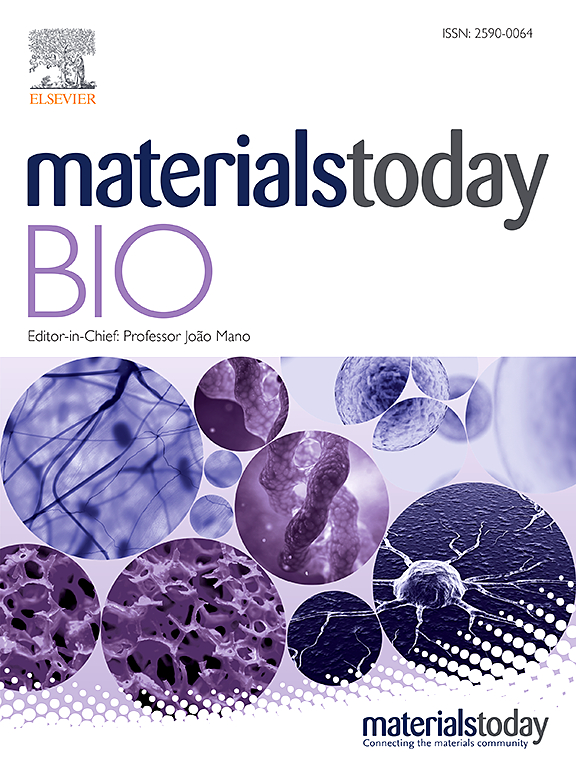Sonogenetics regulation of intelligent engineered bacteria to reverse immune escape
IF 10.2
1区 医学
Q1 ENGINEERING, BIOMEDICAL
引用次数: 0
Abstract
Cancer immunotherapy resistance significantly challenges its clinical application. Traditional immunotherapy strategies are limited by the difficulty in delivering macromolecular immune modulators into the hypoxic core of tumors, leading to reduced efficacy and the development of resistance. Recently, bacterial-based delivery systems have been identified as a new approach in cancer therapy since bacteria have the potential of penetrating vascular barriers, infiltrating into deep tumor tissues and delivering therapeutics. To enhance the bio-safety and therapeutic efficiency, we developed an ultrasound-controlled, gene-engineered bacterial delivery system in which the bacteria are encapsulated in platelet-liposome hybrid membranes. Upon the application of low intensity focused ultrasound (LIFU), the engineered bacteria (Escherichia coli MG1655) can secrete melittin and granulocyte-macrophage colony-stimulating factor (GM-CSF) within the tumor regions. Melittin has a direct cytotoxic activity and also promotes the presentation of tumor-specific antigens, while GM-CSF reverses the immunosuppressive microenvironment and enhances antitumor immunity. This new strategy integrates bacterial therapeutics with sonogenetics, which provides the capability of achieving precise, controllable, and non-invasive killing of tumors. Based on our research, ultrasound-activated bacterial systems may be a new strategy for cancer immunotherapy.

超声遗传学调节智能工程细菌逆转免疫逃逸
肿瘤免疫治疗耐药性对其临床应用提出了重大挑战。传统的免疫治疗策略受到大分子免疫调节剂难以进入肿瘤缺氧核心的限制,导致疗效降低并产生耐药性。近年来,由于细菌具有穿透血管屏障,渗透到肿瘤组织深部并递送治疗药物的潜力,因此基于细菌的递送系统已被确定为癌症治疗的新途径。为了提高生物安全性和治疗效率,我们开发了一种超声波控制的基因工程细菌递送系统,其中细菌被包裹在血小板-脂质体杂交膜中。在低强度聚焦超声(LIFU)的作用下,工程菌(Escherichia coli MG1655)可以在肿瘤区域分泌蜂毒素和粒细胞-巨噬细胞集落刺激因子(GM-CSF)。蜂毒素具有直接的细胞毒活性,也促进肿瘤特异性抗原的呈递,而GM-CSF逆转免疫抑制微环境,增强抗肿瘤免疫。这种新策略将细菌治疗与声源遗传学相结合,提供了实现精确、可控和非侵入性杀死肿瘤的能力。基于我们的研究,超声激活细菌系统可能是癌症免疫治疗的一种新策略。
本文章由计算机程序翻译,如有差异,请以英文原文为准。
求助全文
约1分钟内获得全文
求助全文
来源期刊

Materials Today Bio
Multiple-
CiteScore
8.30
自引率
4.90%
发文量
303
审稿时长
30 days
期刊介绍:
Materials Today Bio is a multidisciplinary journal that specializes in the intersection between biology and materials science, chemistry, physics, engineering, and medicine. It covers various aspects such as the design and assembly of new structures, their interaction with biological systems, functionalization, bioimaging, therapies, and diagnostics in healthcare. The journal aims to showcase the most significant advancements and discoveries in this field. As part of the Materials Today family, Materials Today Bio provides rigorous peer review, quick decision-making, and high visibility for authors. It is indexed in Scopus, PubMed Central, Emerging Sources, Citation Index (ESCI), and Directory of Open Access Journals (DOAJ).
 求助内容:
求助内容: 应助结果提醒方式:
应助结果提醒方式:


